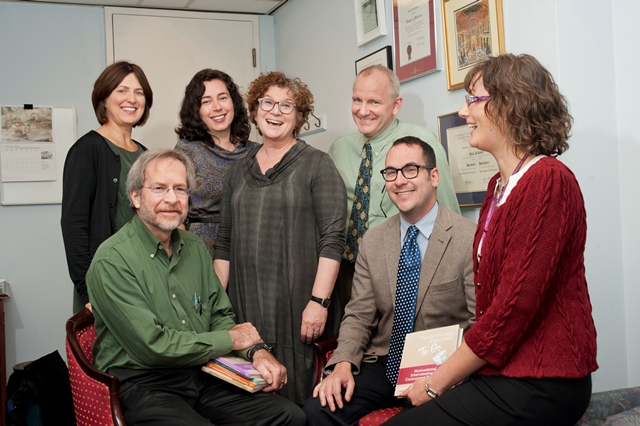
A first-of-its-kind, five-part multimedia book series created by two of Mount Sinai’s own is helping clinicians bridge the gap for patients with mental health issues.
Psychotherapy Essentials to Go (WW Norton, 2013) is a series of interactive educational tools for frontline health care workers treating patients with mental health conditions. The series’ editors, Drs. Paula Ravitz, Director, Mount Sinai Hospital Psychotherapy Institute and Morgan Firestone Psychotherapy Chair at the University of Toronto, and Robert Maunder, Mount Sinai Psychiatrist and Head of Research in the Department of Psychiatry, wanted to create a resource that took established psychotherapy research off the shelves and into the front pockets of primary health care providers, community health workers and mental health specialists.
“In this series, we’ve put complex ideas into plain language. It is an approach that resonates with learners who have lots of expertise along with those who are new to psychotherapy, regardless of their professional discipline,” says Dr. Ravitz. “The tools in the books are all supported by evidence. We are trying to help patients with common mental disorders to become more resilient, feel better, and manage the stresses of life through psychotherapy.”
Each title includes lesson plans, case studies, role play transcripts and a DVD with captioned demonstrations of therapeutic techniques to help integrate guidelines into patient care. Each case-based learning module enhances a clinician’s ability to help treat anxiety, depression, emotion dysregulation and concurrent substance abuse disorders.
“One of the biggest issues in mental health revolves around access to resources,” says Dr. Mark Fefergrad, Head, Cognitive Behavioural Therapy, Sunnybrook Health Sciences Centre and co-author of Psychotherapy Essentials to Go: Cognitive Behavioral Therapy for Depression. He says that while many evidence-based psychotherapeutic interventions have been incorporated into national treatment guidelines, not enough mental health professionals are trained in these modalities. As a result, there are substantial wait times in most centres across Canada.
MORE: Mount Sinai researchers uncover new gene linked to blood vessel growth
In fact, the series launched on the heels of a study that highlighted the growing need for mental health care in the country. In September 2013, Statistics Canada reported that 20 per cent of Canadians reported getting no help for mental health care in the past year, while 16 per cent said their needs were only partly met. Overall, one in six Canadians believed they needed mental healthcare in the past year. Furthermore, counselling was mentioned as the highest unmet mental health need.
“These books are intended to help ameliorate this problem,” says Dr. Fefergrad, who is also Director of Postgraduate Medical Education, Assistant Professor, Department of Psychiatry, University of Toronto. “The book series represents a wonderful example of using an evidence-based teaching tool to disseminate evidence-based treatments. The users of the books can then provide effective treatments to people suffering from mental illness across the country.”
Drs. Maunder and Ravitz agree that the books are another way to support health care training and continuing education so the best care is provided to patients in both urban and under-serviced rural areas.
Some of the materials have already been used by health care workers in community mental health clinics in Northern Ontario (funded by the Ontario Ministry of Health), where the books helped improve access to professional development for mental health providers. They also helped foster collaboration between mental health experts and front-line community mental health services through an interprofessional knowledge exchange program.
Feedback from the Northern Ontario focus groups has been overwhelmingly positive. Participants reported an improved sense of self-efficacy in their professional roles and the confidence in acquiring new skills to expand their therapeutic repertoire. Other participants said the work-based small-group learning format fostered cohesion and collegiality with their colleagues.
Other leaders in the field have praised the innovative series. “Psychotherapy Essentials To Go is a truly impressive series of books,” says Zindel V. Segal, PhD, Distinguished Professor of Psychology in Mood Disorders, University of Toronto–Scarborough and author of The Mindful Way Through Depression. “Elevating pragmatics over dogma, it is grounded in the wisdom of front-line psychotherapists who adapt the core principles of empirically supported psychotherapies to flexibly address a myriad of clinical issues. No other series of psychotherapy handbooks is as skillfully concise and yet thorough. It will quickly become a standard reference for teaching and enhancing clinical competence.”
The books are also being adapted and used in Ethiopia as part of a global mental health project for improving patient outcomes in low- and middle-income countries.
The Psychotherapy Essentials To-Go series is available online or at bookstores across the country. The books are sold as a set or separately: (1) Cognitive-behavioral Therapy for Depression, (2) Cognitive-behavioral Therapy for Anxiety, (3) Interpersonal Therapy for Depression, (4) Motivational Interviewing for Co-morbid Disorders, and (5) Dialectical Behavioral Therapy for Affect Dysregulation.

